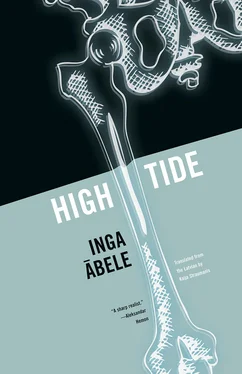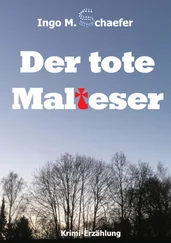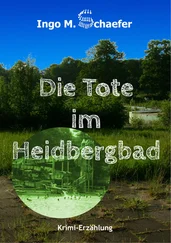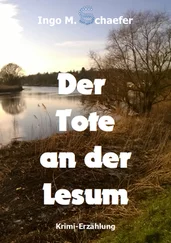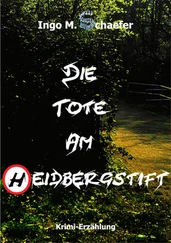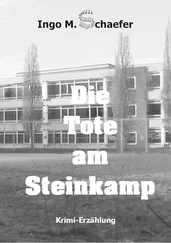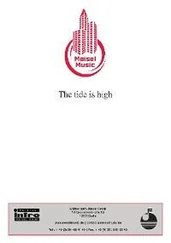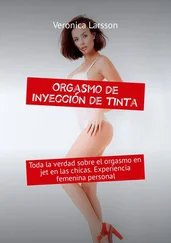“It’s late. We’ll talk tomorrow.”
“No, now! I’m living in your apartment, I’m grateful, but all I ask is that you never butt into my business again!”
Lūcija straightens up with the last of her strength and presses her fists into both sides of her lower back. The front of her robe is dark, soaked with water. The bathroom is as narrow as a test-tube — full of damp steam and the ineffective hum of the washing machine motor — an uncomfortably small space.
“Then pay me. What’s that look for — you think it’s not hard work? Then find someone who’ll watch your kid for free from morning to night.”
Ieva is so shocked that she starts to sputter:
“And I thought… out of kindness… that you guys…”
“We’ll never not support you, even if it would mean living in a box ourselves. But it’s not easy. It’s not easy.”
Ieva considers what she’s heard. It’s not easy on her mother, she has to admit to that. But — it’s not easy for any of them.
“Listen, Mom,” she finally says. “You’re right, but I don’t get what that has to do with you butting into my life. I asked you a specific question — why did you call my husband?”
Lūcija gets angry and plunges both hands into the mouth of the washing machine, throws the clothes into the bathtub with such force that water splashes up onto the walls.
“Because you need money! You have only one set of clothes, and if you weren’t able to dry them overnight you’d have to go to work naked!”
At that moment Aksels sticks his head into the bathroom.
“I’m really sorry, but could I get in here for the toilet? Oh, Ieva, you’re home, too? Great!”
They give each other a kiss and then Ieva and her mother go into the hall. As soon as Aksels is behind the closed door, Ieva whispers harshly:
“Thanks for your great advice, but I don’t need it!”
Her mother calls after her:
“Take the money from Andrejs if he gives it. Monta is his daughter, too! Don’t be so prideful!”
Life on Pērnavas Street ends with her mother’s relative from the countryside who can no longer take care of himself.
One Sunday Ieva notices a gaunt, nearsighted old man in large horn-rimmed glasses wandering the apartment with a cane. Monta has just woken up and is riding her tricycle around in reckless circles and getting stuck in the narrow doorframes. She rides into the old man’s legs and honks her horn. He starts to shout, spittle flying, and bangs his cane against the floor.
“Don’t run me over! Don’t run me over!”
This repeats several times. Ieva kisses Aksels and goes into the kitchen to make coffee. Then, hair disheveled and half-asleep, she takes her mug and goes to stand in her parents’ room. Her mother is sitting at her desk reading the Nature Calendar, her father is watching Formula-1 on TV.
“Morning! Who’s the old guy in our apartment?”
“Oh him! My grandmother’s brother, Uncle Alfrēds. He has high blood pressure and sought refuge with us.”
Ieva takes a long drink of coffee and thinks Uncle Alfrēds’s blood pressure is probably not going to drop while he’s here.
“Where is he staying?”
“Here. For a week already, if you haven’t noticed.”
Her mother points to a mattress next to the bookshelf.
Her parents watch her closely. Ieva senses what they want to say. Another of Uncle Alfrēds’s moose-like bellows comes from the narrow front hallway.
Ieva picks up Monta, tricycle and all, and goes into her room. Aksels is still asleep, his bare arm slung over his eyes.
“Let’s go for a walk!”
“Don’t want to.”
Ieva dresses Monta, then suddenly says:
“We can’t stay here anymore, Aksels. Think about it.”
She and Monta go to the park, where there is an abundance of fresh air, sun, and pigeons. Ieva is jealous of the pigeons. Everything for pigeons is always higher and freer.
Ieva watches Monta swing and thinks about Andrejs. That Monta is his daughter.
Monta is Andrejs’s daughter.
Andrejs’s daughter.
Suddenly she gets an idea — she finds a phone booth and calls Andrejs:
“Hi! Can you lend me two hundred lats?”
Silence on the other end. Then:
“What for?”
“That’s not important. Can you help me or not?”
“Of course I can. When have I ever not helped you?”
With a secretive smile, Ieva buys a newspaper on the way home that’s filled with ads for apartment rentals. She’ll tell Aksels that the money was an unexpected bonus.
Their next home ends up being a long communal apartment on Blaumaņa Street. Aksels has gradually made friends with the eccentrics of Old Riga, and this apartment is the ghostly mirror of their world. It houses all types of people and it’s a miracle if they can stay in their own rooms for more than a few minutes.
It’s right in the center of Riga, and from the outside the building looks pretty respectable. But if the odd passer-by were to look at it longer, he’d see its hidden bruises and open wounds. The stone balcony of Ieva’s and Aksels’s fourth-floor room slopes dangerously low like a droopy lower lip. A small birch tree growing through the cracks in the balcony scatters reddish leaves right onto the sidewalk. The beautifully carved stone faces under the building’s eaves are crumbling and eroded by moisture.
There’s no door code to get into the stairwell, so it’s used by both bums and cats as a place to sleep. Their apartment starts with a large kitchen, which, among people looking for something to eat, is cluttered with old appliances — a gas stove, a pile of rusted radiators, and broken refrigerators. The kitchen is always full of people and they use the broken appliances as tables. A long hallway leads into the body of the apartment. It’s accented by cement beams, almost like a windpipe with rings of bone leading into the stomach of a sleeping beast. There are nine rooms across from each other — the last door is the bathroom, with a shower and toilet.
“There is nothing new, we can only try to coordinate our lives with everything that has existed since the beginning of time,” Ieva sits in her room reading Roberts Mūks. She likes this time and everything it brings with it — like a tumultuous river that overflows with silt during the rainy season. She likes the birch tree on the balcony and the high ceilings. Andrejs’s money was also enough for two beds. Aksels made two pretty bookshelves at the carpentry shop. And then there was the old Continental typewriter that had been waiting for them in the empty room — like a gift — apparently left behind by the previous tenants. Ieva puts a sheet of paper into the black frame and slowly types out letters with one finger. Vowels and consonants, with and without the diacritics. Capital letters. Lowercase letters. She explores the typewriter like a traveler in a new country. Only Ieva has nothing to write about. Might as well copy Mūks. Ten times: “There is nothing new, we can only try to coordinate our lives with everything that has existed since the beginning of time.”
She copies Mūks and then starts to form her own, simple sentences: “The fir tree is growing.” “Monta is growing.” “Monta is my daughter.” “Aksels and I will be together forever.” And she’s fascinated by how the words, once they’re typed out, suddenly take on a public format. Whether she wants them to or not. Accidentally or on purpose. Like a carpentry shop turns a fir tree into a sample display door. So that’s the hidden secret of writers! They just write with a typewriter! Put their words into a concrete format. They command words.
In the meantime, Monta explores the apartment. She goes into each room, and the residents of each room eventually bring her back to her mother. It becomes a reason to have a cup of tea and start up a conversation. Their neighbors include art and philosophy students, punks, the singer of an underground band and her boyfriend, a German-language instructor, and provincial poets.
Читать дальше
